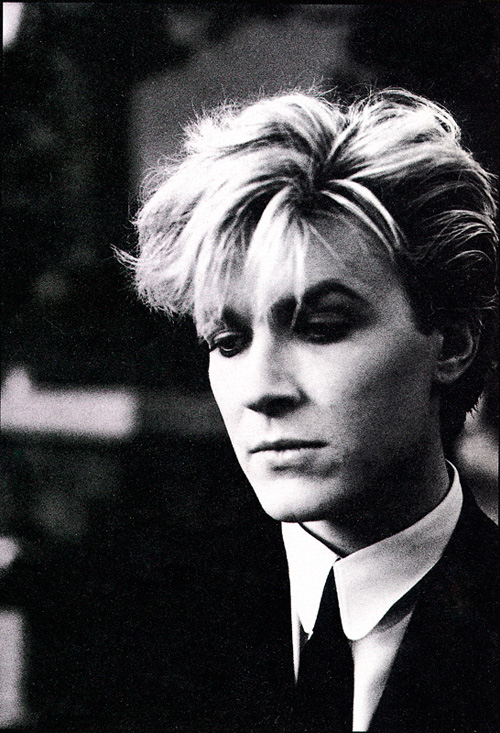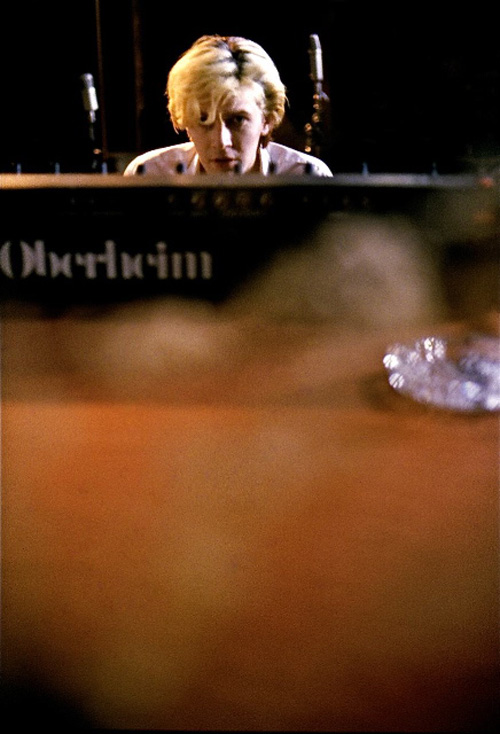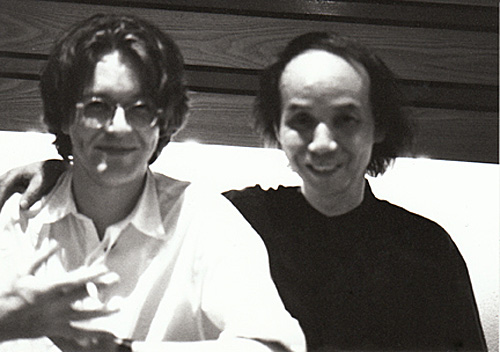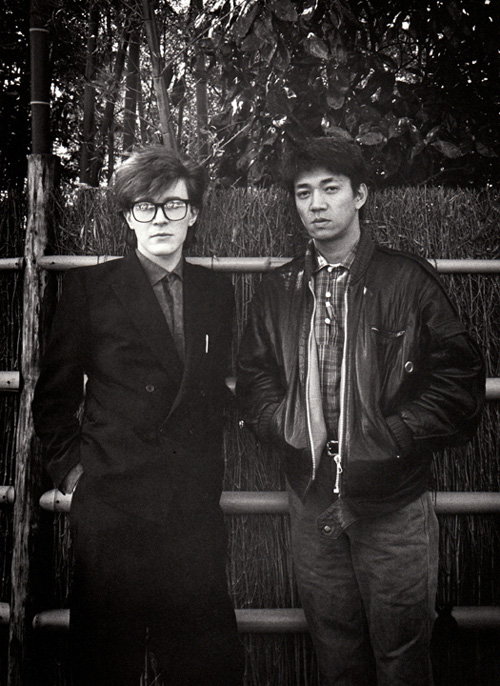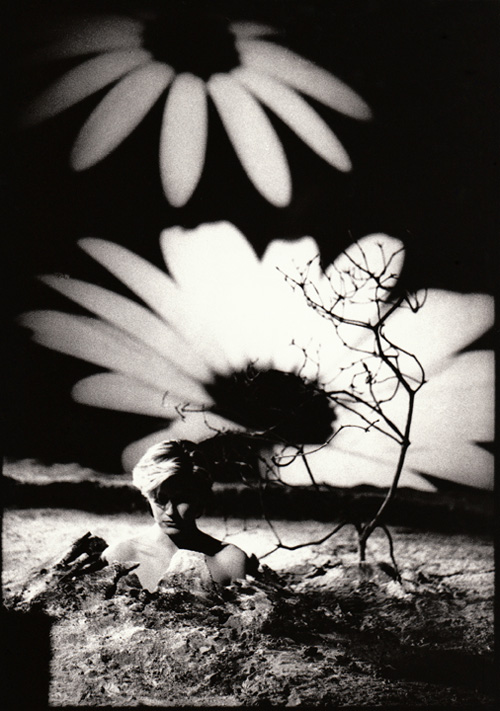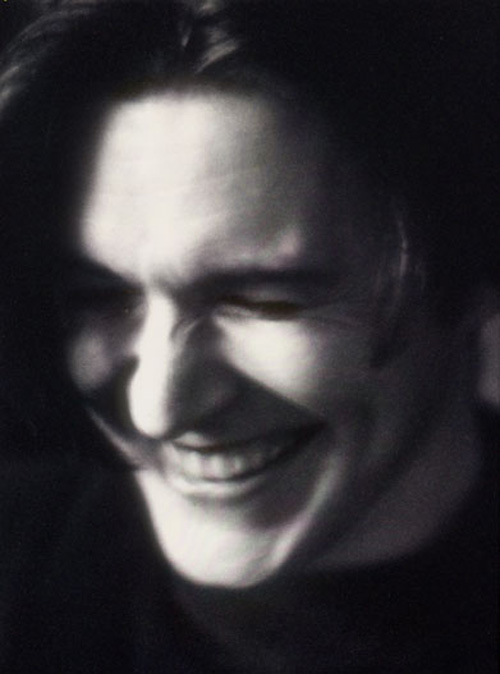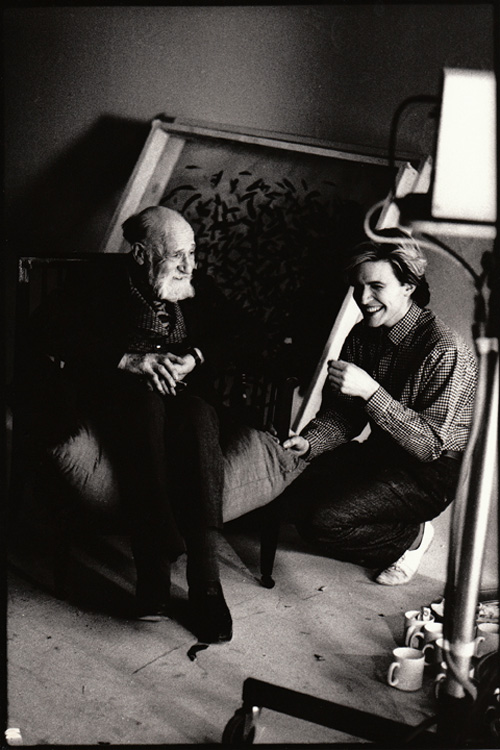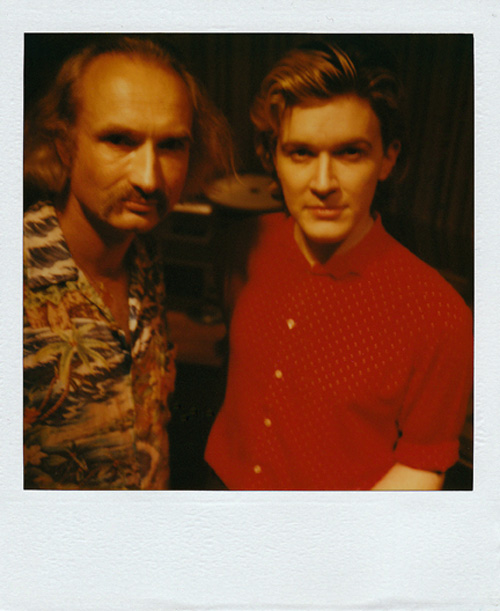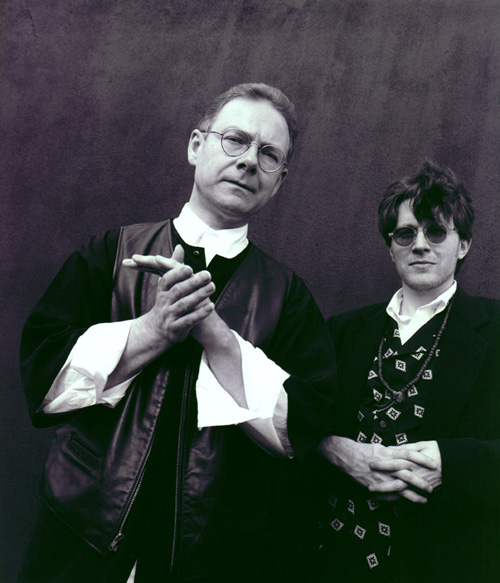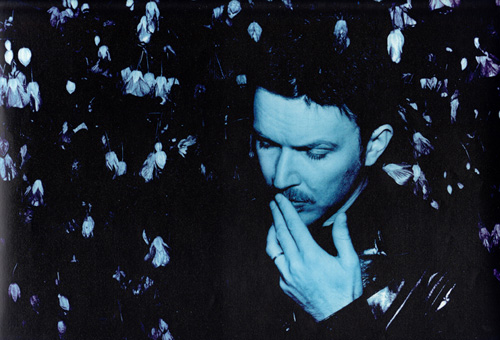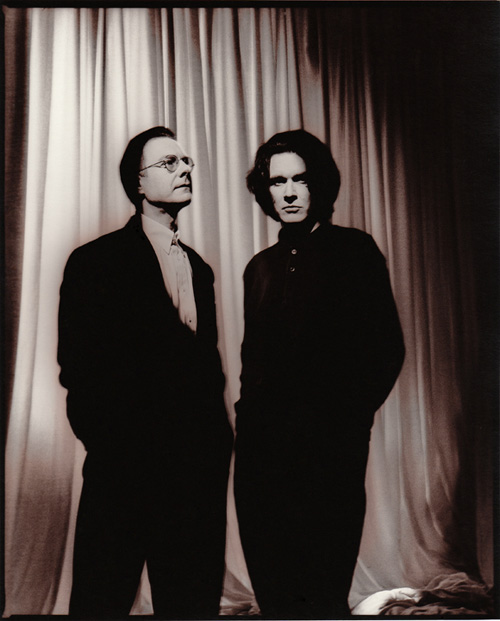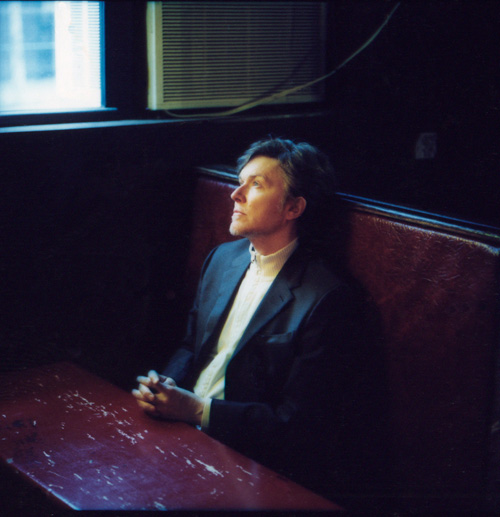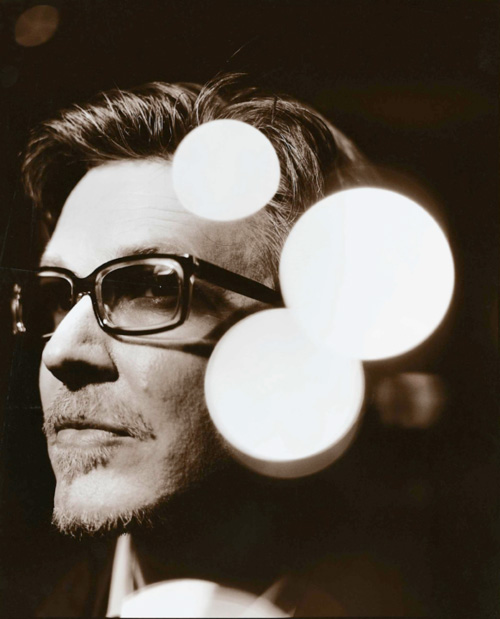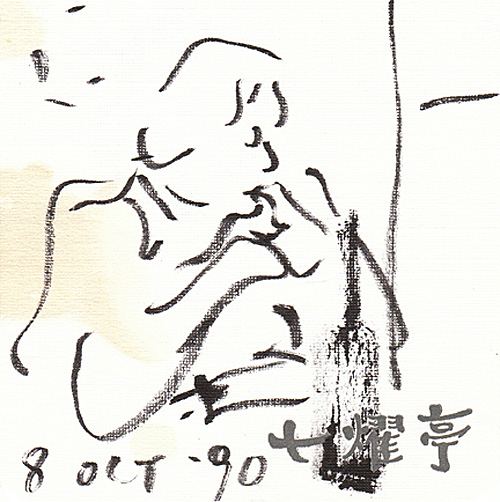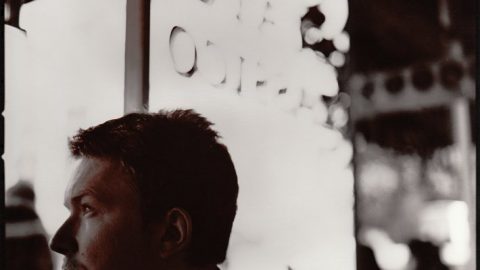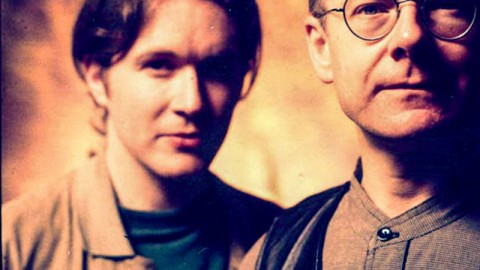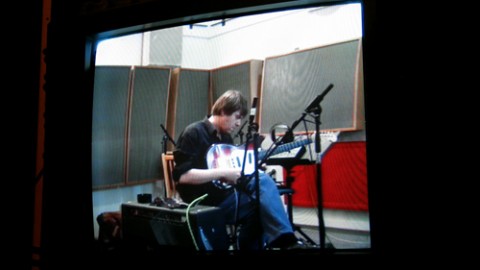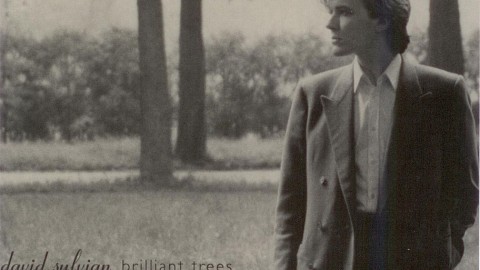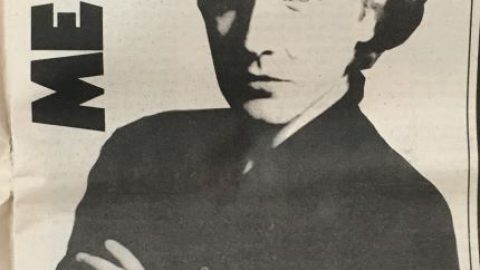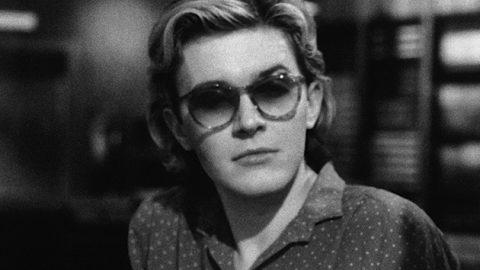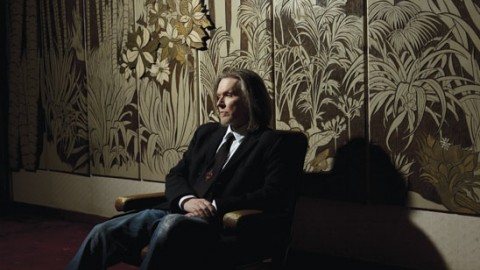The following is the original Q & A which appears in edited form in the 7th issue of Fourth Door Review. David Sylvian interview: questions prepared by Oliver Lowenstein 18.9.04.
Japan I believe you traveled to Japan the country after disbanding the band. The first questions are about your sense of the culture of Japan.
I first traveled to Japan with the band, and on numerous occasions, from around 78 onwards.
What did you uncover when you finally arrived in Japan the country. Was it recognizable, or as completely different in a lost in translation sense to how you had fantasized it by calling the band after the countrys name? Or was there perhaps a sense of found in translation?
A little of all of the above. Japan has many faces some of which I could only glimpse, rather frustratingly, though overwhelmed and somewhat oversaturated, from the windows of hotel rooms, cars, trains, television, and the media at large. At the time of our first visit to Japan the band was at the height of its popularity there. The local promotion and security were so fearful for our wellbeing that we were treated as virtual prisoners by our hosts. This procedure was a touch heavy handed, and while not unnecessary, I suspect it was more trouble than it was worth to allow us the freedom to roam independently if at all.
Id read up on the culture to some degree, had seen a couple of exotic documentaries that tended to play up the otherness of Japanese culture rather than explore or explain it but I dont think I was quite prepared for the beauty, the incredible aesthetic at work on all levels that is an integral part of the culture. The novelty value of visiting a culture so radically different from ones own, especially when young, cant be understated . That first visit was one sustained intake of breath, a real high. On another level there was a sense of homecoming. I believe I wasnt the only member of the band to feel this sense of belonging. There was an intuitive connection to the people and culture which some of us went on to explore in greater depth as the years passed and the opportunity presented itself. This belonging was experienced in tandem with full comprehension of my sense of alienation, dislocation (this sense of alienation can play havoc when not in the right frame of mind. That alienation now shorthanded as a lost in translation experience). Socially I didnt belong, outsider, foreigner (racism was expressed more openly at that time), but my heart did. Oddly, as the years went on I felt more at home socially in Japan than anywhere else due in part to my natural inclination to intellectually isolate myself somewhat from my immediate environment. Far easier to do in a country in which it is taken for granted that you do not speak the language. This ease might also be attributed to the comedy of manners, another essential aspect of social interaction. Being shy and, as a consequence, occasionally fearful of social interaction, I enjoyed the formality, and therefore a certain comforting predictability, of the exchanges.
Were there particular aspects of Japanese culture which were particularly meaningful to you rather than others? What of the hi tech versus traditional Japanese cultures? Both ends of each of these spectrums are celebrated in the simulated versions of the country picked up in the mediaworld? I wondered what your experience was?
Both extremes can be experienced in everyday life in Japan. It has less to do with location (Tokyo vs Kyoto) and everything to do with the emotional, psychological, philosophical, socio-historical development of the national consciousness. While Tokyo seduces with its architecture, technology, urban complexity, at root, in essence, youve the same consciousness at work there as in a rural Japan. At least thats my take on it. There is a social consciousness in Japan that links the community as a whole. It celebrates and promotes the health of the group over the individual. This leads to a heightened sense of conformity but it also paves the way for a developed sense of social awareness missing in many western cultures. For my part I was attracted to these pillars of Japanese culture. The forward thinking modernism, the deeply assimilated Buddhist/Shinto based philosophy or belief system.
If you were interested in elements of traditional Japanese culture, and apart from Kyoto cardboard cutout that the West gets of Japan, which elements were you interested in?
A part of me has always been attracted to a hermit-like, self-contained existence. I guess thats something that will always be with me. The life of the Zen Buddhist, while spare and ascetic, held me in thrall for quite sometime. Buddhist teachings ultimately became my most deeply rooted connection with the place. And I wouldnt knock that cardboard cutout image the west has of Kyoto. A lot of it rings true and as a seductive point of departure there are far worse places to start. I was also interested in Japanese literature; Basho, Junichiro Tanizaki, Mishima, Kenzaburo Oe etc. Music was an attraction of course, in particular the Imperial court music known as Gagaku. The keening sound of the Sho just pierces the heart. I believe it was Takemitsus use of this instrument in contemporary settings (In an autumn garden?) that first drew me to his work. Architecture, pop culture and design were other, more contemporary touchstones.
What did you learn about the Japanese and the Japanese culture from Ryuchi Sakamoto
Anything I learned about the Japanese from Ryuichi was simply absorbed via osmosis. I would find it very difficult from this vantage point to pinpoint specifics. Other friends and acquaintances opened discreet doors for me. There was a very memorable new years eve spent in Kyoto with Yuka Fujii, and the musician, Stomu Yamashita. Stomu had something of the proselytizer about him or maybe the temple master. Knowledgeable on many a subject, a wonderful storyteller, passionate about Buddhism, Japanese culture and tradition, and of course music. I came away from that brief acquaintance with a greater appreciation for the subtleties and the difficulties of the path and its teachings.
I am intrigued by the possible psychic move, or journey, from Japan to India, it reminds me of a possible post modern collage spirituality, though it is probably you growing. It also reminds me of the recent discovery of your colleague, Robert Fripps, involvement with a hybrid Cornish Celtic Russian Orthodox church community. Not that you are in necessarily in anyway involved in any Japanese quest for Hindu spirituality. But Japan seemed the starting point before the wonder that is India began to dawn on you?
It appears to me that the journey has been influenced less by geography that it might initially seem. As Ive said elsewhere, I dont think all of the elements that constitute a spiritual journey are necessarily obvious. Childhood influences must play a major part in ones development but how to pinpoint them? Theres the issue of environment, key moments of revelation, epiphany, disillusionment, insight, intuition, habits, and fears. All appear to play a part in a mind eager for clarification, inspiration, or simply confirmation, going some way towards justifying the intuited awareness of another reality that isnt being owned up to or catered for in the immediate environment or even in the world at large outside of organized religion. Ive always carried with me a faith of sorts, born out of all the above influences and more. This faith wasnt really questioned in any depth until Id emerged from my teenage years. I then questioned every aspect of what constituted that faith. A casting out, doing away with any aspect of a personal philosophy that didnt bear up to close scrutiny. I had already traveled to Japan numerous times at this point and the open-minded approach of the Buddhists mayve influenced the resulting search into various esoteric teachings. The search led me to look into Gurdjieffs teachings, Sufism, Gnostic Christianity, and deeper still into Buddhism etc. At some point or another all of the above held me captivated for a period of time. I felt free to explore whichever avenue of interest cast its spell and, more importantly, produced results. For me, Buddhism held the most persuasive deck of cards. This was the source of knowledge that informed my practice for a number of years without the benefit of a personal teacher. This was ultimately to prove problematic as the practice itself became quite dry and uninspired at which point I actively searched for a teacher. Surprisingly, this search led me to series of teachers out of India whose background was Hindu based. Although I was never told to redirect the focus of my practice, I slowly began to glean the significance, decode the meanings behind the technicolour images of Hindu gods and goddesses, some initially astoundingly gory in their representations, and was drawn into this enticing world, fascinated by the practices, the devotional aspect of the worship, and the, to my mind, indisputable wisdom of the Vedas.
Other media:
I dont know about your films. Could you tell me something of these? Have they been solely with Yasuyuki Yamaguchi or have you worked with various others? How do you feel they relate to your music? Holger Czukay said to me that his video work was like a hobby. Is it like this, or a separate art avenue?
I couldnt speak about the films with any sense of accomplishment. Ive had opportunities presented to me to work with film but with fairly hefty parameters set in place. Ive tried to explore ideas within these parameters but I cant say I feel Ive made a statement in film that comes close to that made in other areas of my work. While I was signed with Virgin Records I attempted to get a number of film projects off the ground with no success. Nevertheless, its an area that retains a fascination for me and that Ill return to at some point when time and opportunity allow.
There are a few albums of yours which include illustrative or graphic work by you, for instance Flux and Mutability. I wondered if you have continued this as part of your creative work? Or whether you stopped doing this a long time ago?
I go in and out of working in these areas depending on need. I occasionally draw and paint but view these activities as entirely personal. I have a keen eye and an uneducated but acutely developed sense of design which I bring with me to all of the work Im involved in e.g. the design aspect of the samadhisound label, photographic work etc. Ive been art directing my cover art since the release of polaroids (80-81) or thereabouts.
Instruments are so over stated Bjrk (though the interviewer makes her sound a tad arch) this week in Londons Big Issue. David Toop talked about Blemish being a recording where you sensed it had been made in a room. How interested/committed are you to the physicality of music making? With the evolution of the internet in its infant days, do you feel virtualisation is to be wholly welcomed, or rather that being so at one with playing a musical instrument, as for instance as Jon Hassell has said of his trumpet playing, that it is a part of his nervous system, remains crucial?
My path has a similarity to Hassells in that my primary instrument is the voice. This provides me with that human element in its most literal sense. Having said that I have no attachment to any other form of instrumentation per se. Im as at home working with an orchestra as, say, a laptop. I go through periods where invention becomes increasingly necessary, where the old sounds, forms, and methods, seem to lose their currency. At others, theres a rediscovery of the past, of values, technique, form. All grist for the mill really. Im a believer in working in the service of the composition. For me the emphasis is on what wants/needs to be expressed and how best to service it rather than experimentation for its own sake or artificial constructs (although not exclusively so). You could call this the soul of the composition. If this speaks clearly enough it tends to dictate what needs to be done, what works in its service, what fails. You learn to listen. When a musician, particularly jazz musicians, speak of listening as a sign of a good, sympathetic player, I tend to think of them not simply listening to the other musicians in the group but to the spirit of the piece, tapping into its soul. Its this listening, an extension of hearing, that is important to me. When we listen we hear the notes, the vibrations, but its whats communicated that moves us and that goes beyond notes played. (Im not speaking of meaning here).
A musician works in the service of the music by whatever means necessary.
Working with Czukay, Hassell, Fripp, etc/early solo recording questions:
How did you work with Holger Czukay, Jon Hassell and Robert Fripp. Did you work with each separately, or did they meet, and work together? Hassell never seemed to be so involved? So did all three or Czukay and Fripp work together at the same time, or separately, and if they worked together did Czukay and Fripp gel?
(not sure which composition youre referring to) I tend to work one on one. I met Jon and Holger for the first time in Berlin in 1983. Jon and Holger knew one another from their time spent studying with Stockhausen but hadnt met since. There was a brief catch up, social interaction between them though no musical performance. Jons intensity was refreshing. There was thoroughness, a rigour, that didnt allow for compromise but instead demanded a clarity of purpose, of intent. Holgers approach was the antithesis of Jons. Joyful enthusiasm, wild invention, much paint thrown at the canvas to see what sticks, manipulation of the results.
I didnt meet Robert until two years later. At that initial meeting we worked alone on material for the Gone to Earth record and the Steel Cathedrals soundtrack.
Quite some time ago I saw what you were doing working with Holger Czukay, Jon Hassell, Robert Fripp, and Danny Thompson, particularly with the Rain Tree Crow project. as a continuation of the spirit of a very magical moment in sixties/seventies music: embracing Can and King Crimson, and even Fairport Convention, as well as others. Yet you were catching this spirit in eighties and nineties. Does this make any sense to you?
I confess that, despite my association with members of two of the aforementioned bands, Im relatively unfamiliar with their earlier work (Id heard a couple of Can albums in my teenage years but knew/know little of early Crimson). If youre referring to a musically free spirit, openly democratic, intuitive, an improvisatory based collective of sorts then I might understand where youre coming from. RTC was an experiment in that respect. Maybe a failed experiment but an interesting failure. An attempt to work with a group of musicians with whom I was able to share a common (musical) vocabulary, to explore ideas and directions without bias. To allow improvisation free reign but at the same time allow for development of the ideas that surfaced. The experiment started well. There was a lot of interesting ground covered in the initial sessions. Ultimately the project seemed to collapse because of a loss of focus. The sessions were drawn out over too long a period. The project became costly and I struggled to retain a handle on the material, to maintain a cohesion, that at times my partners failed to share or comprehend. Nevertheless, it was other forces which eventually contributed to the dissolution of the band. All in all I enjoyed the project enormously and am still fond of much of the material. Its certainly an idea(l) worth pursuing again under the right conditions.
By drawing in Hassell and Czukay theres also a kind of suggestion of exploring further the sub-current of rock music whose origin was from, in some way, the influence, of Stockhausen and Darmstadt Cans Universal music. Did you feel this consciously was part of what connecting with Czukay was about?
Not directly. There was the significant shadow of Stockhausen, that was a given, and Holger couldnt have been more open about the importance of Stockhausens influence on his life and work at the time. But, although Id discovered the work of Stockhausen as a teen and the work had proved influential (particularly for R. Barbieri and myself as referenced on the track Ghosts), as I said, Can were/are a relatively unknown entity to me. My reference for Holger was always his solo material which, to my mind (being only marginally aware of what had preceded it), had slipped the net of historical placement or definition and moved into areas entirely of its own making. In any case the emphasis, the reference for me, has never been consciously, exclusively, rock music, sub-current or otherwise. These arent my roots. I feel as though I was born of a generation that was able to do away with this burdensome lineage to some extent, a generation for whom eclecticism and hybridisation were key words. Growing up wed hear all kinds on music broadcast on British radio. There was no real segregation as there is today in the States and to a lesser extent elsewhere. If you wanted to hear your favourite artist or record played youd have to wade through all kinds of material from rock, pop, comedy, balladry, novelty to reggae, soul, r n b. It was a wonderful education in a way, although, at the time we didnt tend to view it that way. As we got older all of the above and more was available to us. Some take the legacy of a particular strand of music and run with it but to me the point was to breed something potentially new out of the influences, to create interesting hybrids that were a reflection of the diverse musical influences that were available to us growing up. This is why pop music as opposed to rock music can still occasionally be an interesting force to be reckoned with because the sphere of influence is broader, the eclecticism greater. The parameters that embrace pop music are vast whereas in other musical genres that have begun to lose their currency the parameters used to define them have tightened with time, its evolution appears to have slowed to a near halt.
A less charitable interpretation of the Brilliant Trees collaboration which was suggested to me when I heard how Chris Blackwell of Island Records was trying to figure out how to break Bob Marley and the Wailers in Britain in the seventies into the white audience, came up with introducing rock guitar into the music. The band immediately crossed-over into the white audience. I hope this doesnt sound unfair, but Brilliant Trees, with its list of star names can look as if it may have had cogitations to push you into a new emerging audience demographic? Or maybe it was completely spontaneous?
The problem I faced when venturing out alone for the first time was deciding who to work with. My social circle in the world or musicians was not much greater than the members of the band. I dreaded the idea of working with session musicians for whom the material would be all in another days work. The answer came from the compositions themselves. I was working on a home demo of the title track for Brilliant trees. As I began to elaborate on the arrangement I came up with a sound reminiscent of Jons trumpet on a prophet 5 synthesiser and the connection was made. It occurred to me that if I was able to draw a line between a particular composition of mine and a body of work by another artist would they not be able to do likewise? I continued to arrange the material for the entire album and as I did certain connections continued to be made between given compositions and a musical voice. These voices obviously existed within my own frame of reference. These were musicians whose work I was very familiar with. Once it was obvious to me who these musicians should be we tracked them down and asked if theyd be willing to give the material a go. They heard nothing in advance of the sessions, most of the participants had never heard of me. It was due to their generosity and sense of adventure that the sessions happened at all. Not one of the musicians invited declined the offer.
Once in the studio I found that there were indeed wonderfully intuitive connections made. The pieces evolved, not without some difficulty, but intuitively. Based on the positive results of this experience this process of selection became my modus operandi for years to come. It was the compositions themselves that cried out for certain contributors, voices. I tried to obey that call.
As a footnote I would add that calculations such as you imply rarely work. Audiences are fairy savvy where these things are concerned. Greatness doesnt rub off via association, nor credibility or respect. Unless there was real empathy at work these sessions wouldve fallen flat, possibly been derisible.
A career (an awful and inapplicable term in my case but I can think of no other) trajectory such as mine doesnt reside in calculation so much as the pursuit of ones own interests and passions. Japan, it can be said, was a group that fooled around with calculation and artifice in the sphere of pop music and culture where these attributes, if they can be called that, are entirely at home. It was, among other things, the nature of these games that I grew tired of. I wished to explore the work with the same degree of open-faced honesty that Id touched upon with the track ghosts and such calculations wouldnt have been in keeping with this form of psychological and emotional archaeology rather, it wouldve undermined it.
Of course, we dont live in a vacuum, there are external influences at work but these shouldnt be over stated.
In Alchemy: an Index of Possibilities one side of this set of music seemed to map another element in that sub-current of early eighties music, Bob Frippertronics Rock Gamelan, which in turn seemed to source back to Steve Reichs Music for Eighteen Musicians as much as Balinese Gamelan. At the time was this, in a way, part of the idea?
Reich is obviously present in the mix, Robert not (in terms of influence).
Looking back, do you have thoughts about where Rock Gamelan might have gone?
Rock gamelan (first Ive heard of it referred to as such) is one of the most unfortunate terms I think Ive yet to come across. As mentioned, rock music really doesnt make up a great part of my musical background despite possible appearances to the contrary. Dance Gamelan, disco gamelan, techno gamelan.ha..! The goal was to inhabit the world of spiritual initiation and to try and reflect that musically by drawing on a wide variety of influences. It was an immersion into the ritualised, the repetitious and the exotic. It was also a continuation of themes explored on Brilliant Trees that Id wanted to take that step further. As to where influences of this kind mightve gone well theyve never really gone away. You only have to listen to bands such as Tortoise to hear that the direction still has currency.
You describe Gone to Earth as a very difficult record to make. I wondered if its psychology was one of resolution, and given the explicit alchemical overlay of its feel whether you sensed it as an alchemical record.
There does seem to be something of the spirit of acceptance or, as you say, resolution, that must be the product of experience, direct experience of the subject of the journey or inquiry. I was beginning to make inroads I remember. There wasnt so much of that clawing in the dark without benefit of a light. Yes, there are multiple references to discovery as opposed to questioning, the recognition of my own failings, shortcomings and the embrace of the same, the acknowledgement of a presence, an other, to whom many of the pieces are directed or refer to.
I did see the record as being a reflection of that alchemical process from base instincts to the development of higher properties or attributes. I was reading Gurdjieff around this time but was intrigued by the Gnostics, the Rosicrucians also, Pascal etc. This interest didnt lead me away from the clarity of Buddhist teachings but I was briefly held captive by the symbolism, the language, the romance. Ultimately I felt this knowledge obscured as much as it revealed. The straight ahead clarity of the Buddhists, the lack of obfuscation, the indisputable benefits and results of the practice determined that I should stick with the teachings when other avenues of interest had lost their charm.
Russell Mills, in the interview in Fourth Door Review 6, says for him alchemy is a language of metaphor. I wondered both in the article and here, whether you felt differently, or similarly that Russells painting was a visual analogue to ambient music, I wonder if you agree with this, and whether you feel your visual work sits within some kind of visual ambient spectrum.
Id agree with you that Russ work was/is a visual analogue to the field of ambient music. That had to be a conscious influence or consideration in Russells development that saw him move away from the figurative and into these richly illustrative or suggestive images. That description doesnt quite hold true for the GTE artwork which I felt pushed Russell in a slightly different direction at that time. I came to his studio bearing books ripe with illustrations that I felt might work as an interesting starting point for the cover art or discussion thereof. Codex Rosae Crucis was one volume I remember bringing and the graphics of Robert Flood another. They had a clear influence on the nature of the finished work. Russ digested these elements, appropriated them, made them part of his own vocabulary.
My own visual work is a different kettle of fish. I dont tend to think of it in the same light. It doesnt sit comfortably or successfully with the term ambient. Elements of it possibly once did (e.g. the film steel cathedrals) but that aspect seems to have played itself out.
I get a real sense of continuity between your work with Holger and the collaborations with Russell Mills. But is it your sense the ambient Music for Chemists series, the second side of Index of Possibilities, Flux and Mutability and Plight and Premonition records, are interwoven with your work with Russell, Approaching Silence and The Beekeepers Apprentice even if they come out of different experiences both time-wise and in that the latter were the sound content for mixed media installations. Were these pieces of music made in similar or different ways, and how much were they about studios, rooms, loops and the possibilities enabled by recording technologies to uncover moods and atmospheres. Do you see a continuity, and would this continuity be, I guess, your ambient musical voice coming through?
That would be a fair enough comment. Steel Cathedrals was the first step in a new approach for me. There had been a fair amount of room for improvisation in the recording of Brilliant trees but the pieces themselves had an existing, recognisable, architecture, a clear framework that the participants had to be conscious of. With S.C. I loosened things up a bit. I drew out a road map of the dynamics of the piece but left the content open to the participants to decide. I created a backdrop to give the players something to work off of (I was still working one on one, not as a group), there was the ambience, the pulse etc. Then I invited players to respond to this. I did a considerable amount of editing after the fact, cutting and pasting, shifting information around, composing would be the simple word for it.
I have trouble remembering the sequence of events but some time later, possibly after the GTE sessions or later still, Holger invited me to come work in Can Studio, Kln. This was to be the second attempt at building a composition around the improvised input of the musicians involved only this time I was the primary performer and there would be no shifting of the elements after the fact (Premonition) but a fair amount of radical editing of the piece in its entirety (Plight). These recordings also involved the use of pre-prepared loops that Holger used to guide and influence my mood and performance. I began to really enjoy this process of recording and wished to explore the idea further with a larger group of musicians. This ultimately led to the RTC project (theres your Can link right there I suspect).
I do see clear connections between the compositions you mention. Theyre all interlinked in some way. Ideas are carried over and developed on subsequent projects. The Czukay pieces are very much about time and place, Holgers idiosyncratic approach to the recording process and technology. The later pieces in this field owe less to place more to technology. Sometimes its simply a matter of the limited tools at your disposal at others, its exploring a new piece of technology which facilitates a procedure that has in the past been too time consuming and dependent upon access to expensive equipment/studios.
Have there been other artists youve worked with in a mixed-media/installation sense as with Russell? Who, what were the projects? Are there some present projects?
I undertook a second large scale installation after the Ember Glance piece with Russ. It was installed in the P3 exhibition space in Tokyo. The concept and design were my own, the participants included Robert Fripp (text), Adam Lowe, and Yuka Fujii. The audio content of this piece was released as part of the Approaching Silence cd.
I decided not to pursue more installation work after this second piece. There was/is so much of this kind of work out there and yet little of it appears to cover new ground (the same could be said of video installations). In addition it was always difficult securing suitable locations for the work. In short, I lost interest. I havent ruled out future work for public spaces. I need to redefine it for myself so that it might regain my interest and attention.
Songwriting:
When avant rock music began to remove itself from late sixties consensus of what music was, it was the music of the songwriter and specifically electric folk and folk rock, – I think of Bob Dylans Blood on the Tracks or Van Morrisons Veedon Fleece or the work Richard Thompson – which no longer seemed to hold the same counter-cultural cache from the eighties on. Instead electronic music seemed to become associated with representing the most radical musical statements. But your work, from Gone to Earth to Blemish seems to maintain the place and integrity of the songwriter in the increasingly electronic musical environment. While they are very different sets of music, in their different ways, they maintain something of this song writing tradition. That is, David Sylvian, as a part of the remnants of this song writing tradition? Does this make sense, or do you feel song writing and here I am thinking along the lines of Dylan and Richard Thompson – is as strong as ever.
Theres an evolution which must take place for any tradition to maintain its currency. As a vocalist I work with words and music. No matter which avenue I choose to pursue this inevitably links me to the songwriter tradition whether those influences are Dylan, Lennon, Brel, Brecht or Weil. I dont feel a tremendous affinity towards most other writers, in particular that strand of songwriting you indicate in your question (for the record none of the writers you mention have played a part in my own evolution). As mentioned in a response to an earlier question, the music we heard growing up stretched right across the board. Im more likely to have heard and enjoyed a composition by Cole Porter or Rodgers and Hammerstein than say Joan Baez! I feel that at this point in the evolution of song (to quote Mr Porter) anything goes. Its what we can pull from the more general field of song writing into the present time that might still have currency, that a writer may connect with, turn it on its head, and spit back out as an entirely new breed of song, thats of interest. Tom Waits drags the blues kicking and screaming into the 21st century and in doing so renews its currency and extends its vocabulary. Singer/writers such as Robert Wyatt, Scott Walker pull on half a century or more of influences to create a vocabulary of their own. I have attempted to find my own way with song. Of course these influences are only partially musical, more often than not the main impulse comes from other sources, but speaking in the context of the song writing tradition its those writers that came before the 60s generation that have had the greatest influence on my approach to song writing.
How involved did you become in the philosophies of the JB’s: Joseph Beuys and J G Bennett, sound-referenced on Gone to Earth. Or were they referencing markers in the sand on the invisible path you were treading?
An abiding interest in contemporary art eventually led me to the work Joseph Beuys and his theories regarding the role of art in society. Again, there is this reference to the alchemical process of transforming the base elements of society. Working with ideas and a strong sense of community to uplift society, restructure it, empowering the individual via recognition of their own creative impulses etc. In relation to his own physical work I respected the way that he was able to transform the most mundane of materials, lending them magical properties.
My original idea was to meet with Joseph Beuys and record a conversation from which I was going to take extracts to be used throughout the instrumental portion of GTE. We were in the process of making contact with him when he passed away.
My interest in all things Gurdjeiff led me to the writings of J.G. Bennett. Of course, on meeting Robert for the first time I spent far more time inquiring of Mr and Mrs Bennett and their teachings than recording (actually Robert set up a number of Frippertronics loops so we put the machines into record and left them to it allowing us to take tea and talk whilst simultaneously working) which in turn, quite naturally, led to the inclusion of Mr Bennetts quotation on the title track.
India:
In the last Fourth Door Review (6) there are interviews with Sheila Chandra and Jon Hassell, which explores their involvement in drones and raga music, and suggests they represent another kind of Indian music, planetary forms, rather than geographically sourced from the sub-continent classical tradition. I wondered given your involvement with your Guru Ammachi whether you feel connected to the future of Indian music? From your released material Indian music seems to be a backdrop presence.
I have general knowledge of the Indian classical tradition. Having spent the past decade in the company of Indian teachers it seems inevitable that I acquire some knowledge on the subject if only via osmosis. Other elements of the Indian tradition that have made an equally strong, if not stronger, impact are the songs of devotion (bhajans) and mantra recitation.
To imply in any way that I feel connected to the future of Indian music would be misleading and far beyond the reach of my interest, ability and knowledge as it currently stands. Its possible that specific strands of influence (e.g. Sanskrit mantra recitation) may have a bearing on future work and that elements I have absorbed from the tradition of Indian music may surface in one form or another but as I write, this isnt a conscious goal or musical direction Im considering taking.
However I would imagine you have some insight into the Indian musical tradition you talk of Ammachi having a beautiful singing voice what kind of future do you think Indian classical music will have in this new century?
Mine has really been a brush with Indian music rather than anything approaching a study or passion. One of the beautiful things about Indian music is the degree of discipline and years of study it takes to master any element of it. Therefore the likelihood of the tradition being diluted or easily absorbed into contemporary culture on the back of a trend or wave is fairly low. We do find the use of images of Indian gods and goddesses in popular culture but often the significance of these images are poorly understood and at times offensively re-contextualised. Because classical Indian music has comparable resonances on multiple levels we that appropriate elements of it without sufficient knowledge are in danger of taking similar missteps. But there are basics such as the drone, from which many have explored new avenues. The title track from Blemish is based on that principle as has been much of my work over the years. A drone can be simply that or it can take on greater significance depending on the interest, knowledge, and aims of the writer/performer.
Of course there have always been individual performers from deeply rooted traditions that find the means, the common threads, that facilitate cross cultural collaboration but Im assuming thats not what the question was referring to. Indian music, as in the sacred literature of the region, is a living tradition and will continue to make its presence felt globally but on a modest scale.
And in terms of your involvement in ambient, and the future of electronic music do you sense the emergence of a particular Indian electronic music?
Not that Im aware of but then Im a little divorced from a lot of these developments here in the States. There was the Asian underground in London that was given a face by Talvin Singh and others but Ive lost track of those developments. It failed to sustain my interest. Lazwell has been pushing the envelope with his brand of multi-culti collaboration but, no disrespect, I fail to see where any of this is leading or if its furthering the cultural exchange in any significant way. But then Ive become increasingly sceptical of these cultural exchanges. Not in the moral sense but in the artistic. Jons fourth world notion of a coffee coloured music has yet, to my mind, really take off in any significant way although all the signs are certainly pointing in that direction. A certain brand of exoticism has been mined but has become mired in the romantic, the jam session, or alternatively, the dance floor. Rarely has it touched that deep magic realism core that Jon mined so successfully in the 70s and 80s.
Currently, my interest lies where the world of the contemporary classical, the avant-garde, and electronic music, intersect.
Your immersion in your Guru Ammachi reminds me of the Indian mother Guru archetype another example might be Aurovilles The Mother I wondered if you see some of your music as at times connected to the feminine principle?
I guess you can read this connection into much of my music going back as far as Brilliant trees if not further. In terms of my own nature Ive always found it easier to embrace the feminine rather than the masculine as the masculine element, as it was represented to me growing up, was steeped in anger, violence, and associated with fear. It has taken me 40 years to reach the point where Im able to embrace the masculine side of my nature on a compatible footing with the feminine. This bias therefore is represented quite openly in much of my work.
Theres a kind of plangent ecstasy at times in both lyric and music, which as far as songs go feels at times, for instance on Dead Bees I surrender, kind of reminiscent of Rumi. Have you read much Rumi, and been consciously influenced by him?
I have read Rumis work as well as other poets whose work is born out of the experience of the divine. No, I cant say I was consciously influenced by Rumis work. Its possible that once one experiences the divine for oneself the tendency and danger is to fall into clich when trying to relay that experience verbally. The terminology used to describe such experiences has become hackneyed to some extent. Rumi, and the myriad other poets of the ecstatic, have encapsulated the experience of divine love and longing, of devotion, beautifully but if were to go on speaking of such things then we need to become more resourceful.
I surrender was as clear an account of a personal experience as I was able to make at the time. I felt I was successful in relaying it but it isnt a language I feel comfortable returning to.
New Age Metal/Techno:
Your collaboration with Robert Fripp, The First Day, possesses a kind of passionate anger to it. It also feels like a new age metal music? You have talked at times of progressive forms of spiritual musics. Do you feel there is true spirituality in acknowledging and exploring destructive emotions and channelling it into musical creativity, and this is a kind of progress, expressed musically?
It takes awareness and a certain kind of courage or abandon to delve deeply into the more negative emotions. We dont question the value of such excursions in the worlds of literature or film and I think the same values hold true in words and music also. If the insight is true on the part of the writer, if it is a process of creative discovery, real engagement with the self then it can potentially have benefits for both writer and audience. The comprehension of the negative states, how they function, their dominion, the habits and self deception of the mind, the suppressed emotions etc are all to be grappled with on the part of the spiritual aspirant. Without this there can be no development.
As for the notion of these outpourings indicating progress; I have trouble with the notion of progress when speaking in spiritual terms. There is nothing about the journey that indicates it is in any way linear. It is extremely difficult to pitch markers of progress. Tackling difficult subject matter might indicate a growing awareness, ability to self analyse even in the midst of disturbance, an ability to retain a certain objectivity during complete immersion.. more than that I dont know.
How about other uses music is put to? How do you feel about heavy metal music becoming integrated into the virtual combat kit that young americans are equipped with to fight in theatres of war?
It could just as well be loud audio signals of discomforting sine waves. I dont think in this instance content has much relevance. Music is put to all kinds of uses just as language, as any medium. The question is too open ended for a concise response.
I suggested earlier that your music feels to my ears at least to connect to the post sixties spirit (in essence connected in someway to the year 1968: Can, King Crimson, Jon Hassell). It feels that only in the nineties did a post post sixties music techno, electronica and digital musics begin to emerge, where the generational links to the late sixties and early seventies have been cut and something new is emerging. While in many respects you seem to connect with what I feel was a very magical moment of creative energy the late sixties music – you also seem to inspire and draw inspiration from the nineties, or post-post 60 music. Do you feel as if your music has been a bridge between the eras, and do you feel any particular loyalty to the differing times and musical cultures?
Because the link you perceive between the late 60s and my work isnt something Ive cultivated or am particularly aware of Im unable to view my work as a link of sorts. I understand the argument might be convincingly put forward but to be honest its coming at the subject from the wrong angle as far as my interests are concerned. To me the question was, is, how to remain interested in the activity of making music? What needs to be expressed and how best to express it? What are the means available? I dont tend to view myself, my work, in a musically historical perspective. In every sense I stand on the periphery. Im self taught, the necessity of a man who is on the outside, with few friends or connections. My education, musical and otherwise, is filled with holes. Ive never heard albums by Elvis, the Beach Boys, Pink Floyd, The Who etc. My knowledge of Hendrix is sketchy. My general education was poor. Ive had no mentors that werent busy trying to exploit me. I have followed what has made me passionate about music, the arts, and life. I have pursued only that. My leaps and excursions from one point to the next are fuelled by the extent and limitations of my research, interests and, more importantly, needs. An album by Holger Czukay exists in virtual isolation for me. Maybe Im in constant danger of reinventing the wheel, missing the plot. Thats my handicap if you will. You use what you can to your advantage. So, there is no loyalty to an era, to one musical culture over another. Ive never belonged anywhere that Ive found myself. Its been a frustrating reality of mine that Ive learned to embrace. I belong on the periphery because thats where I find myself in every single aspect of my life. Ive found, repeatedly, that I can do nothing about this so Ive stopped trying. No allegiance, just enthusiasm, interest, insight, passion, and necessity takes me where Ive got to go.
Place and America:
New Hampshire feels off the rock map. Neither New York, Los Angeles, New Orleans, Austin or San Francisco. How is it there? Can you relate to it as a musical place, a landscape which can inform the atmospheres, moods and landscapes of your musics?
I respond to it as a place of retreat and isolation. Sometimes the sense of isolation is numbing, it can be intensely lonely, at others it is the perfect antidote to media and cultural saturation, a place for emptying out, selective absorption if you will. Winters are hard here but also extremely evocative.
9/11 sent out cultural shockwaves, including re-evaluating aesthetics did it have this effect on you?
I tend to believe that the nature of my work is best served somewhat divorced from the day to day shifts in global politics. That viewpoint hasnt changed since 9/11 although that event and the events that followed did help put many things into perspective. Living in America during this period I, like many people, have felt an enormous sense of outrage at this administrations response to the 9/11 attacks, its hijacking of the moral right of the country, its promotion of the patriotic (surely the concept of patriotism is something we shouldve outgrown decades ago?), fear mongering to aid the pursuit of pre-set goals and ideals etc. Meanwhile the US media transformed itself into a virtual mouthpiece for the administration. It became increasingly clear that there was no free press worth its name in the USA. As a result of this Ryuichi and I recorded a couple of pieces in protest of the US stance on the wars in Afghanistan and Iraq. These pieces were aimed at the American people and can best be viewed in that light. Ultimately the songs were created out of an enormous frustration at the absence of any visible and effective dissent. It was an attempt to add to the collective voice of protest that was being so successfully drowned out in this country.
I still strongly believe that politics and music make poor bedfellows. Still, because of the change in climate there is possibly less complacency, a greater sense of urgency in recent work. I cant view the personal and the global as independent of one another. To me they are interconnected. The influences that are at work upon us globally are the same as those at work on us individually, and in the home. If one speaks of personal conflict and upheaval as I have done in recent work then this can be viewed as a microcosm of what may be happening on a global scale. This is indeed a human scale on which it is possible to relate and all the more effective for it. Political change starts with a shift in the heart and mind of an individual or group of individuals. I think this is an area where art might still prove itself effective.
Europe:
You used to namecheck ECM artists as being influential on your musical sensibility? Is the work of ECM, in its promotion of a particular European sensibility, still relevant to you. Do you see other musics, other labels taking over the space ECM promoted for many years?
ECM has in many respects lost its edge. It could be argued it was always a rather benign edge but now the music too often slips into coffee table tastefulness (much like ex-ECM artists such as Frisell, Metheny et al) but in the New Series theres still important and fairly radical works being recorded. Eicher has done a tremendous job creating a clarity of vision and a standard of excellence which few have come close to.
Mike Harding of Touch is doing a tremendous job as is Jon Abbey with Erstwhile. Rune Kristofferson with Rune Grammaphon, Gnter Mller with For 4 ears. John Zorn continues to release a prodigious amount of material, always of interest, often excellent.
Id wouldnt say Im faithful to any one labels output though. Theres a fantastic diversity of material out there if youve the patience and interest to pursue it.
The work with the Austrian musician, Christian Fennesz. The relationship between delicacy, healing and music as weapon, onslaught, noise as a weapon, sonic terrorism. When I went to see Fennesz I left the audiotorium in Brighton, wondering if I was drifting into middle age when I didnt get what is considered pretty cool around the noise-merchants scene, though also pondering whether the post 9/11 context demands something else, something to do with delicacy, care and beauty, as referred to above?
We are struggling to find new vocabularies that speak to us at this moment in time. New ways of listening that wake us from our complacency. I think a balance can be, and often is, struck between the sonic assault, delicacy, and extreme, truly extreme, subtly and beauty. In the best work of this yet to be defined genre there is much to be appreciated in this respect.
In light of your question maybe it should be pointed out that many of the biggest names in this field are into their middle age. It is not, as some believe, the (exclusive) playground of youth.
You contributed a piece to Fennesz recent Venice release. Although Venice is Fenneszs record I wondered how you feel about connecting to Venice with its symbolism (and sign) of sinking languorous decadence (Death in Venice?) I often ponder on why contemporary music seems apparently innately attracted to decay, rather than life and emergence. Given your spiritual path, as well as your Euro sensibility, I wonder whether you have given thought to connecting to more hopeful semiosis, though equally mid-European resonance for instance Prague and its associations of the Velvet Revolution and tradition of Bohemia, or Zagreb with a resurgent revitalised Balkan country, or Sarajevo the battered, destroyed San Francisco of the Balkans. All these would have been suggestive of emergence.
The sense of loss is personal isnt it? An exiles lament. It is about time as much as it is about place. It is the erosion and decay of self, ideals, and of recognisable values. History as artefact, cultural tourism, loss of lineage. The exile of thought, of the thinker, to the periphery of social significance. Americas influence, its dumbing down of culture so as to exploit the masses, its non-English speaking citizens. Culture as entertainment (only) etc. All these aspects appear to come into play when considering a piece like Transit. Culturally there is so much of interest at work in the world and yes, in some parts of the world there is a sense of emergence but it too is in a fairly fragile, intermediary, state. Whilst the removal of oppressive political regimes has been a positive development. rapid assimilation into Western style capitalism is an ongoing concern. Technology has placed the power of creative freedom into the hands of so many but the climate of American style capitalism is one of callous opportunism. I think the model has failed. We need new alternatives.
A New Age:
You use negatives in your language which in stock new age would be referred to as shadow material Damage, Blemish and the very title of band project, Rain Tree Crow. No sunlight here. This seems to be very much part of your progressive interpretation of Spiritual growth, which you also referred to in an interview: “the whole New Age view of peace and light is just a partial view. If you are moving along a path of spiritual growth you have to face up to the darkest parts of your own human emotions. It isn’t easy; there are tremendous highs and lows. You don’t get off lightly. Now some questions.
I wondered how much has this way of coping with, and integrating of emotions, been a result of past psychological work? How much is it to do with being involved, in tangential form at least, with the punk time? And what does your Guru make of this, if she knows anything about it?
Certainly, the psychological work was valuable with respect to coming to terms with negative emotions. I would place greater emphasis on the benefits of working with a teacher in whom its possible to place complete trust. Surrender to the Guru is a truly difficult, anti-intuitional, process. But within the ongoing act of surrender so much can be observed. Greater realities than those were used to admitting to come into play. Unfathomable but undeniable realities. In this respect its possible to become a witness in some respects of ones own life experiences. This objectivity helps place things in perspective. The process isnt an easy one. At least I havent found it to be so. The past 4 years in particular have been truly testing on many levels. The only reason I feel able to deal with these issues is because on some primal level there is knowledge of the illusionary nature of life. So while on one level I experience my emotional life as only too real I also hold dear the knowledge that it is illusionary and to be attached to it is one of the sticking points in my own development.
Exploring the further reaches on the negative emotions in a work like Blemish became possible because of the above. Ive always had a tendency to shut down during periods of emotional hardship. Long periods of depression have been the result. Whilst still prone to this habitual response I am also equipped with the tools that allow me room to breathe, recognize the issues, draw from the bigger picture and so on. It felt safe within the confines of my studio to push myself further and further into these negative emotions, to explore them in depth. It wasnt always easy shrugging them off at the end of the day but neither was it potentially hazardous. The completion of the work was extremely cathartic for me.
As I now struggle with divorce, separation from family, emotional isolation etc. I grapple with all that I have learned over the past decade or so. What works, what is truly valuable? This is an ongoing process. I see no end to it. One occasionally reaches some kind of plateau where it is possible to see clearly where one has been and the growth process involved. A higher level of comprehension is achieved. You coast, you bask in this knowledge while its available to you in such clarity. But sooner or later along comes the next seemingly insurmountable object and the need to gather all ones resources to overcome it will be necessary.
I also wondered if this (dissenting new age) perspective has attracted any attention within the mainstream new age community, and how those in the mainstream have taken on board your observations about the new age movement being apparently oblivious to the spiritual dimension of the tradition of avant rock and jazz. For instance – in last years Wire interview – you gave the example of John Coltrane.
Ive never received a personal response of any kind and fail to keep abreast of such things in the general media.
On your most recent release, Blemish, it feels strongly as if you have torn up your musical vocabulary, shaping a new musical language, at odds with the harmony and resolution which feels like it characterized so much of your recordings. If you accept this reading, how did this re-shaping come into being?
Purely out of necessity. The need to speak of things I hadnt dealt with before. I had to wipe the slate as clean as I could to make a fresh break. All vocabularies that had been available to be over the years appeared inadequate in dealing with this subject matter. Each morning I emptied my emotional self as best I could, stepped through the studio door and pursued whatever surfaced without restraint. I was in enormous psychic pain but I was also riding a creative high. An odd dichotomy.
The actual songs also bespeak a psychic pain, a certain sense of inner claustrophobia, and a presentation of turmoil. Again, this is very much at odds with the prevailing image of David Sylvian up to the present, as if we are seeing a David Sylvian stripped bare. How much is this the case, and how much, as David Toop suggested in his review of the record, might this be only another layer, skin or persona you are putting forward? If you feel like responding to this.
Hopefully the above answers this question.
Improvisation, Guitars and the Internet:
There is considerable improvisation on the release, mainly working with Derek Bailey. How, if you do, do you feel these improvisation differed to your previous experience of improvising?
The sessions themselves werent that dissimilar from the earlier miniatures Id recorded with Frisell for example. The main difference was the speed with which they were executed. No sooner had I scratched out a lyric and melody than they were being recorded courtesy of having my own work space. I enjoyed the rapidity and immediacy of the process, performing the material while it was still in the process of evolving. This increased its sense of urgency to my mind and gave the entire work an edge.
You seem to have a particular penchant for partnering work with futuristic guitarists, Robert Fripp, David Torn, Bill Frisell, and now Bailey. Who else might you work with? Have you considered/played around with other lead instrumentalists? And do you see the guitar at risk of being marginalized by the emergence of digital domain?
Of course you couldve included Christian Fennesz in that listing of guitarists and that wouldve answered your question for you. No, I see no need for any instrument to find itself marginalised by the advent of the digital by default.
I have worked with a number of trumpet players and have considered that instrument an important second voice in my work.
Do you feel improvisation will flourish with the internet, or does it need a live context to maintains its vitality?
The purists would no doubt argue that the live context is vital but I believe there are a variety of forms of improvisation all of which have their own validity. There is plenty of improv in the world of electronics, some of the most exciting work out there is on that crossroads I mentioned before where electronics, jazz, and contemporary composition meet. Yes, I think the internet does and will continue to provide an improvisatory platform for musicians and artists working in most media.
Three last green, kind of, questions:
Fourth Door Review is in part intended as a green cultural magazine. I recall you once speaking of your music as containing a sense of foreboding. With hurricanes, increased awareness of the fragility of the future and with Global Warming ever more to the fore in public consciousness, I wonder whether you feel a heightened sense of foreboding, and any specific connection with the green cultural community?
I did for many years feel a connection with the green movement. Ive been a card carrying member of various organizations for years. Beyond that there hasnt been a specific cultural connection with the community.
This is in part asked because there are a stream of references to the natural world, particularly trees, and the wood world, of course, in your work, and I wondered how much the natural world influences you, in comparison to the inner emotional, psychic life?
It played a more important role in the past than it currently does. Thats not to diminish its present role but I think I relied upon it to a greater extent in the past in absence of clear or partially clear comprehension of my own emotional and psychological states. It became a simple method or metaphor for communicating complex and often discomforting emotions. I am influenced by sight more so than any other sense. Images, man made or otherwise, that the eye absorbs have always be profoundly evocative and filled with associations both conscious and otherwise. They resonate on so many complex levels finding reflection and answer in my inner life which I attempt to explore via words and music.
I also wondered if since establishing your own studio whether you have considered and perhaps carried out any practical/material work on your buildings including the studio – to make them green and ecodesigned?
I certainly considered this when building the studio. I found that there wasnt a whole lot of flexibility in this regard when working with local builders and I lacked the financial wherewithal to go elsewhere. But I did my best to work within personal guidelines. Most of the house is heated by sunlight which keeps fuel consumption to a minimum. This house, as odd as it is, was to have been an ongoing project for me. The oldest building dates from the 1700s, the most recent addition prior to the studio was a large extension added in the mid 1980s. I was drawn to the idea of being entirely self sufficient up here. From a business standpoint we recorded, rehearsed tours, designed, in house. There are one or two bio-dynamic farms in the area to which we belongedetc. If I speak of these issues as belonging to the past it is because following the dissolution of my marriage much has changed.
Thats it. Sorry its so long. Said it was thorough. Hope youve found the questions of interest. Oliver Lowenstein
Many of your questions were deserving of longer answers. My apologies for the brevity of some of the responses.
ds
Original article on davidsylvian.com
